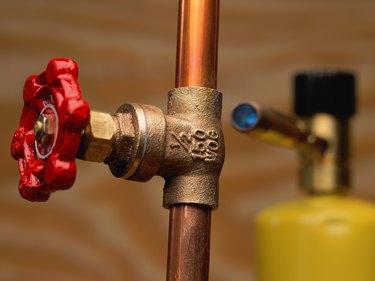
Salt water pool systems offer conveniences for homeowners. They eliminate the discomfort associated with normal chlorination systems and they are easy to maintain. But one of the biggest grievances of salt water systems, as expressed by homeowners, is that it causes accelerated corrosion. Salt and other factors can contribute to this damage. It's best to replace copper pool pipes with plastic ones when you're dealing with any type of chlorination system. Otherwise, you may need to replace them when copper begins leaching into and discoloring your pool water.
Salt Water and Metal
Video of the Day
Salt water systems are best for pools that don't have a lot of exposed metal parts, and the same also goes for regular chlorinated pools. With any type of chlorination system, copper pipes eventually corrode, as does any aluminum or metal pool equipment in the vicinity. If your pool has copper piping, your best bet is to switch it out for plastic or be prepared for corroded pipes. Many homeowners with salt water systems claim that the salt causes pipes to corrode faster, though there are probably other factors that contribute to the corrosion.
Video of the Day
Replacing Copper with PVC
A specialized pool service person can help replace your metal pipes with corrosion-proof PVC or other plastic piping. If you want to tackle the job yourself, you will need to purchase the appropriate PVC piping and a specialized adapter that connects copper to PVC piping. Replace all connectors and other plumbing equipment with metal-free PVC parts, according to manufacturer instructions. This may require some excavating and know-how, so consult a professional if you're unsure of the process.
Assessing Corrosion
Though many homeowners report that salt water corrodes their metal pipes, a low pH in their water and high levels of chlorine are just as likely to cause the problem. Test your pH to make sure it is at a neutral pH. If it is low pH, it could be too acidic, which is the main factor causing corrosion in copper pipes. The metal ions that can enter the water from corrosion can change it many colors, such as blue, green and red. Discolored water is a sign that there may be high levels of metal present in the water.
Addressing the Problem
There are a few possible sources when copper leaches into pool water. A copper heat exchange unit or even copper-based algaecide additives could be causing the problem. If you think copper is present in your pool water, you can test it to be sure. If you're concerned about high levels of copper, apply a chelating agent to prevent the metal from oxidizing. Remove and replace copper piping if it is heavily corroded.